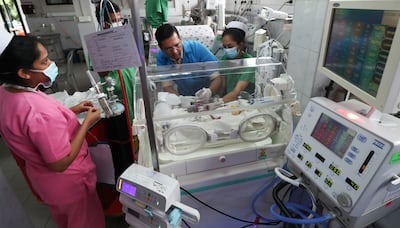Crucial medical supplies worth millions of dollars flown into Sri Lanka are keeping hospitals open and saving lives during the country's worst economic crisis in decades.
Overseas donations sent by air freight and packed into shipping containers are a lifeline for hard-hit medical facilities.
Senior doctors told The National that about 80 drugs are still in short supply.
senior neonatologist
About $9 million in medicines and supplies has been donated by countries, while organisations and groups delivered medicines worth almost $1.3 million, Dr Anver Hamdani, Sri Lanka’s Ministry of Health co-ordinator for healthcare service, told The National.
“This bailed us out. We were running out of stock of 14 vital drugs and now we have almost secured these,” he said.
“You can’t supplement vital drugs with any other drug, there are no substitutes, so it was critical to bridge this gap.
“Of 646 essential drugs, we ran out of 350 initially, but now there is a shortage of about 82 drugs.”
Vital medication included anti-rabies vaccine, blood thinners to protect against heart attacks and tablets to treat inflammation.
Essential medicines are required in intensive care units and include drugs to dissolve blood clots and injections to manage low blood pressure.
Aid keeps health services afloat

The ministry oversees 1,200 healthcare institutions and distributes medicines to government hospitals and clinics.
Daily meetings monitor stocks and officials work with donor nations and organisations to shore up supplies.
“We have managed not to hit rock bottom but rather float at a lower level,” Dr Hamdani said.
“The volatility is still there but we are trying to handle this.
“First we focused on vital medicines and we are now focusing on essential drugs.”
Countries that shipped medicines include Bangladesh, Indonesia, India, France, Vietnam, China and Nepal.
Sri Lankan residents in the UAE, Australia and the US have also dispatched supplies.
Doctors hope the medical crisis will begin to be addressed from September when loans pledged by the World Bank will be available for the purchase of medicines.
Saving lives

Among the most vulnerable patients are premature babies and sick infants.
A distressed audio message from a Sri Lankan doctor in early April to colleagues abroad went viral and galvanised the community.
Dr Saman Kumara, senior consultant neonatologist at Colombo’s Castle Street Hospital for Women, said it pained him to ask staff to sterilise and re-use endotracheal tubes essential in neonatal units.
The $1 tubes connect to ventilators to help infants breathe.
“I started shivering when I heard we were running out of endotracheal tubes because without that you can’t save babies lives,” said Dr Kumara, who is also president of the Perinatal Society of Sri Lanka.
“The plastic tube is cheap but without it you can’t do any magic, even with high-tech ventilators because this connects the baby and the machine.
“It was substandard to ask staff to start washing, sterilising and preserving these, but there was no other option.”
Within a few days of the WhatsApp message, the doctor received more than 600 calls promising support.
“We are very grateful to everyone who helped us, if not we would have been in greater trouble,” he said.
Nitric oxide, a gas for newborn babies with breathing difficulties, which costs about $1,400 per cylinder, was also supplied by a donor.
“If you don’t have this gas, babies with that condition definitely will die,” Dr Kumara said.
“We did not lose a single baby because of that donor.“
The hospital recently issued an appeal for monitoring devices to gauge the heart rate, oxygen levels and blood pressure of sick infants.
“We have started a fundraising project to increase bed capacity and get 15 good quality para monitors to save lives,” he said.
Medical catastrophe
The island nation imports 85 per cent of its medical requirements and the foreign exchange crisis wrecked hospitals' ability to pay for essential imports.
Citizens in Sri Lanka have access to free medical treatment ranging from outpatient care to major operations.
But the country’s universal healthcare system has suffered a breakdown with surgeries cancelled and media reports of doctors operating by torchlight because of power failures.
Outpouring of support
Sri Lankan expatriates in the UAE have been working with people in India, Australia and the US to secure supplies ranging from catheters, syringes and heart medication, to injections to treat anaemia in kidney patients
Sri Lankans in the Emirates have spent more than $80,000 on medication sent home.
“When we hear from doctors that supplies save the lives of premature babies, we feel connected to helping our people,” said Isthiaq Raziq, president of Sahana, a welfare association in the UAE.
“Parents, organisations, schools have come together to help. It is a catastrophe if you are hospitalised and the hospital does not have supplies so you can live.”
A request for cotton wool and gauze from Dr Hamdani was met with surprise.
“We thought it was a minor matter because cotton and gauze is not life saving,” Mr Raziq said.
“But we soon realised it was a number one priority. Doctors told us how people can lose their lives because they don’t have supplies to stop bleeding.”
Fuel crisis

Protests continue to rock the country.
Acting president Ranil Wickremesinghe was sworn in as Sri Lanka’s new head of state, replacing ousted leader Gotabaya Rajapaksa, who fled to Singapore after protests in which crowds occupied the official residence and office.
There is no end in sight to the economic meltdown, with inflation at more than 50 per cent.
Schools are closed and people are being asked to work from home to conserve fuel.
The medical community too is concerned about the effect of the fuel crisis.
“It is a total crisis, from food to mobility and medicine,” Dr Hamdani said.
“If healthcare workers cannot come to work and are unable to provide care, that will be a big challenge.”
People can email moh.covid.coordinator@gmail.com for more information about medical aid required.



















